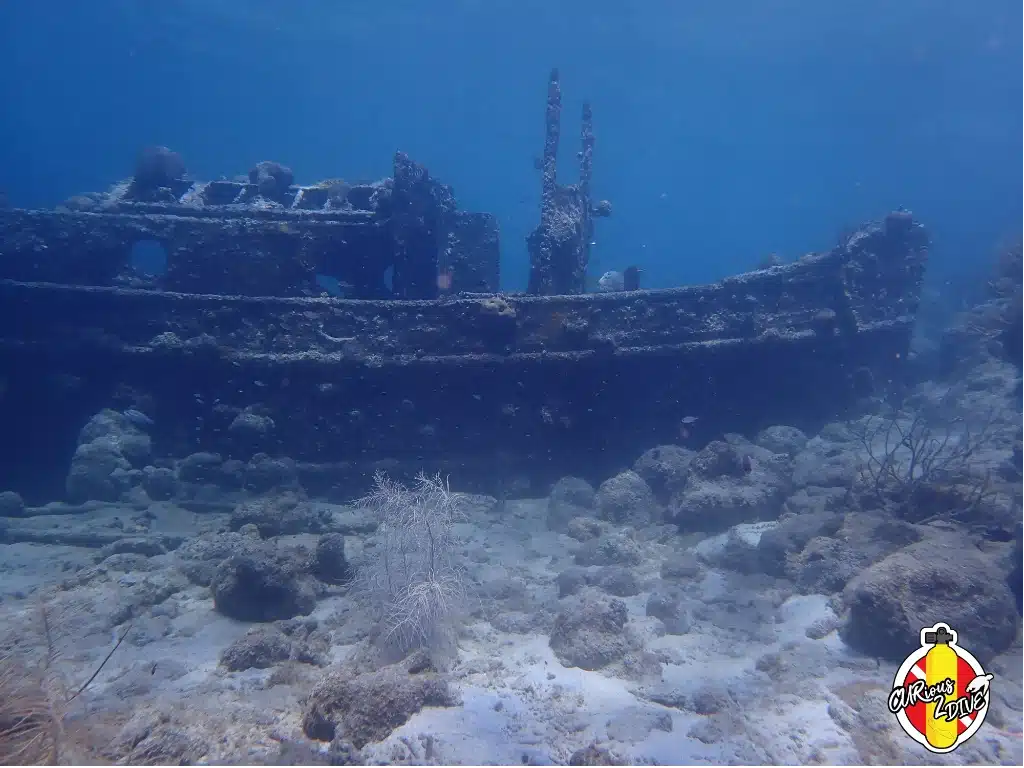All photos credit: Anne Kazel-Wilcox unless otherwise noted.
The sun is setting in Curacao as I sit in Fort Nassau, sipping Blue Curacao liqueur. From this historic restaurant, a former 1700s fort used to defend the Dutch against invading enemies, I have nearly 360-views of the island. The lights of the colonial capital, Willemstad, twinkle nearby. The island’s highest peak, Christoffel Mountain, rises in the distance, while azure waters below beckon me for some of the best shore diving, i.e. scuba diving, in the Caribbean. This is, by far, my favorite of the ABC islands—the Dutch islands of Aruba, Bonaire, and Curacao, situated just about 50 miles north of Venezuela. So, I’m back to discover what’s new amid the colonial old. Plenty, it turns out.

For starters, I settle at the luxurious Curacao Marriott Beach Resort. Nestled on a crescent shaped beach, it’s a sprawling resort that provides the feeling of privacy even amid a buzz of activity, including a section with an adults-only pool. The resort underwent a $42-million renovation, with the beautiful open-air architecture of its massive great room inviting in balmy trade winds that Curacao benefits from year-round. There’s pretty snorkeling right offshore, a dive shop on site, and it’s the chosen resort for performers at the annual Curacao North Sea Jazz Festival (headlined in August 2025 by Marc Anthony). The resort is also about equidistant from east and west ends of the 40-mile-long island, making it a good launching pad for exploring the natural beauty of the island.


Dramatic Ocean Vistas & Diving
I head to the west end and Shete Boka National Park. How I’d missed this park on prior visits, I’ll never know, as it boasts exhilarating, dramatic vistas over rugged limestone bluffs and coral caverns. At one vista, Boka Pistol, waves crash and explode like geysers, while in another area, lava hills lead to natural rock bridges. Curacao has an arid climate, and this park is no exception with cactus aplenty. But fortunately, you can drive among scenic points and there’s hiking trails as well. (Rent a car for a couple of days to explore Curacao; driving is on the right.)



Not far from that park on the island’s tip is Westpunt, a diver’s haven. There are over 70 dive sites along Curacao shores, with some of the best in this Westpunt area. I head out on a boat with Go West Diving to a top site, Watamula, which in Dutch originates from the word “water mill.” I see why given the swift ocean currents providing rich nutrients to stunning, massive coral gardens.
Cabanas & Cuisine
Back to topside civilization in the evenings, I explore a new island trend with a St. Barth’s vibe: fine beachside dining beside cabanas and daybeds for rent. Mondi Beach Club is one such hotspot, its elegant infinity pool surrounded by tiki umbrellas and views of cruise ships, while Mood Beach Restaurant is another, along a sweeping white sand beach. It’s easy enough to slip from cabanas to Caribbean cuisine, from daybeds to “dushi,” which means sweet, good, or nice in the local Papiamento language. More off the beaten track is Pasawa Box Eatery, a massive courtyard filled with street food vendors in a fun setting with music, murals, and boisterous tables of revelers. It’s hard not to have a good time at this happening place.





Curacao’s Up-and-Coming Soho
The UNESCO World Heritage capital of Willemstad is about midpoint on the island, and I make a visit. A pontoon bridge spans the colonial city with Punda on one side and Otrobanda (other side) opposite. While Punda’s riverfront appears pretty with its multicolored buildings and market, it is a bit gritty and overrun with souvenir shops. For strolling, I prefer Kura Hulanda Village in Otrobanda, a re-imagined colonial village with artsy galleries and upscale boutiques. Intriguing on the Punda side, however, is the neighborhood of Pietermaai, which has all the makings of a Soho renaissance, its streets marked by bright colonial-style structures being converted into chic condos, cafes, and lounges. The neighborhood also has a great boutique hotel, BijBlauw. I climb its rickety steps to discover lovely loft-like accommodations, while out back is a sweet spot of waterside dining and quite possibly the most scrumptious breakfast I’ve ever had—cinnamon stroopwafel pancakes, a Dutch specialty.







Then it’s off to the eastern end to wear off waffles by hiking along salt marshes and mangroves with a great guide, Waldemir of Myronchi Trips, who points out native wildlife including hummingbirds and bloblo (blue-blue) lizards. I wrap up my tour of discovery at nearby Director’s Bay, where there’s casual beach bars, gorgeous snorkeling, and a sunken tugboat to dive. Emerging from the deep, those trade winds whip around me. They seem to keep Curacao forever cool. But while winds may be a constant on Curacao, I’ve learned that everything else around the island seems to be filled with the new.




Check out the Curacoa website for more info: www.curacao.com
Where to Stay:
Curacao Marriott Beach Resort: Luxury waterfront resort with five dining concepts, kids club, adults-only pool, snorkeling, and more.
Location: John F Kennedy Boulevard, 3, Piscadera Bay, Willemstad
Tel: 5999-736 8800
http://www.marriott.com/en-us/hotels/curpb-curacao-marriott-beach-resort
BijBlauw Boutique Hotel:
Chic, small hotel in trendy Pietermaai neighborhood, with accommodations from cozy to loft-like suites with kitchens.
Location: Kaya Wilson Papa Godett 82-84, Willemstad
Tel: +5999-6500551
https://www.bijblauw.com/

